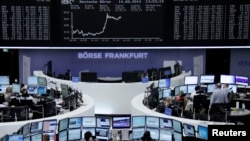The economy in Europe's 18-nation eurozone has stalled.
After a year of weak growth, the European Union said Thursday the economic fortunes of the countries that use the euro currency flattened in the April-to-June period.
The region's three biggest economies failed to advance, with powerhouse Germany, along with Italy, both shrinking two-tenths of a percent. The French economy stagnated.
The eurozone is collectively the world's largest economy. It faces high unemployment, though, along with consumer-price growth that is less than a quarter of the inflation rate sought by the European Central Bank, as well as nearby political and armed turmoil with Russia's intervention in eastern Ukraine.
The stagnating eurozone economy contrasts markedly with the economies of its biggest trading partners, the United States and Britain, which has a separate currency. In both the U.S. and Britain, the economies have been advancing, although sometimes unevenly since the depths of the global recession in 2008 and 2009.
The eurozone remains 2.4 percent below its peak before the crisis struck six years ago.





